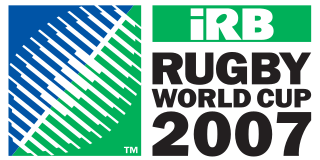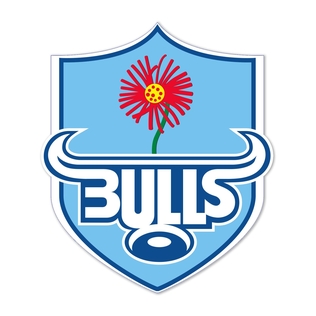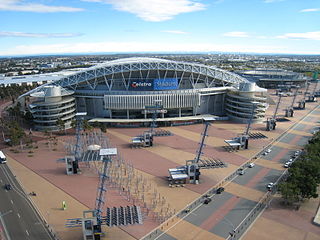Related Research Articles

Association football, more commonly known as football or soccer, is a team sport played between two teams of 11 players each, who primarily use their feet to propel a ball around a rectangular field called a pitch. The objective of the game is to score more goals than the opposing team by moving the ball beyond the goal line into a rectangular-framed goal defended by the opposing team. Traditionally, the game has been played over two 45-minute halves, for a total match time of 90 minutes. With an estimated 250 million players active in over 200 countries and territories, it is the world's most popular sport.

Rugby union football, commonly known simply as rugby union or more often just rugby, is a close-contact team sport that originated at Rugby School in the first half of the 19th century. Rugby is simply based on running with the ball in hand. In its most common form, a game is played between two teams of 15 players each, using an oval-shaped ball on a rectangular field called a pitch. The field has H-shaped goalposts at both ends.
A football is a ball inflated with air that is used to play one of the various sports known as football. In these games, with some exceptions, goals or points are scored only when the ball enters one of two designated goal-scoring areas; football games involve the two teams each trying to move the ball in opposite directions along the field of play.

The 2007 Rugby World Cup was the sixth Rugby World Cup, a quadrennial international rugby union competition organised by the International Rugby Board. Twenty nations competed for the Webb Ellis Cup in the tournament, which was hosted by France from 7 September to 20 October. France won the hosting rights in 2003, beating a bid from England. The competition consisted of 48 matches over 44 days; 42 matches were played in 10 cities throughout France, as well as four in Cardiff, Wales, and two in Edinburgh, Scotland.

The Bulls, for sponsorship reasons known as the Vodacom Bulls, is a South African professional rugby union team based in Pretoria and they play their home matches at Loftus Versfeld. They compete in the United Rugby Championship, having competed in the Super Rugby competition until 2020. Prior to 1998, the Bulls competed in the then-Super 12 as Northern Transvaal, as in those years South Africa was represented in the competition by its top four Currie Cup sides from the previous season, instead of the modern Super Rugby teams.

Leinster Rugby is one of the four professional provincial club rugby union teams from the island of Ireland. They compete in the United Rugby Championship and the European Rugby Champions Cup.

A rugby ball is an elongated ellipsoidal ball used in both codes of rugby football. Its measurements and weight are specified by World Rugby and the Rugby League International Federation, the governing bodies for both codes, rugby union and rugby league respectively.

A goalkeeper is a position in association football. It is the most specialised position in the sport. The goalkeeper's main role is to stop the opposing team from scoring. This is accomplished by having the goalkeeper move into the trajectory of the ball to either catch it or direct it further from the vicinity of the goal line. Within the penalty area goalkeepers are allowed to use their hands, giving them the sole rights on the field to handle the ball. The goalkeeper is indicated by wearing a different coloured kit from their teammates and opposition.

A football is the ball used in the sport of association football. The name of the ball varies according to whether the sport is called "football", "soccer", or "association football". The ball's spherical shape, as well as its size, weight, mass, and material composition, are specified by Law 2 of the Laws of the Game maintained by the International Football Association Board. Additional, more stringent standards are specified by FIFA and other big governing bodies for the balls used in the competitions they sanction.

The 2003 Rugby World Cup Final was the final match of the 2003 Rugby World Cup, the fifth edition of the Rugby World Cup competition organised by the International Rugby Board (IRB) for national rugby union teams. The match was played at Stadium Australia in Sydney on 22 November 2003, and was contested by Australia and England. The 20-team competition consisted of a group stage, from which eight squads qualified for the knockout stage. En route to the final, Australia finished first in Pool A with four wins and no losses or draws before defeating Scotland in the quarter-final and New Zealand in the semi-final. England finished on top of Pool C and, like Australia, went undefeated with four victories and no draws before beating Wales in the quarter-final and France in the semi-final.

A drop goal, field goal, or dropped goal is a method of scoring points in rugby union and rugby league and also, rarely, in American football and Canadian football. A drop goal is scored by drop kicking the ball over the crossbar and between the posts of the goal posts. After the kick, the ball must not touch the ground before it goes over and through, although it may touch the crossbar, the uprights or an opponent. A drop goal in rugby union is worth three points, and in rugby league a drop goal is usually worth one point.
The experimental law variations (ELVs) were a proposed set of amendments to the laws of rugby union. They were proposed by the sport's governing body, the International Rugby Board (IRB), and trialled games at Stellenbosch University in 2006. In 2008 thirteen of the 23 variations trialled were played globally including; greater responsibility for assistant referees, corner posts no longer considered to touch in-goal, no gain in ground if the ball is moved into the 22-metre line by a player from the same team as the kicker, quick throw ins can travel backwards, no restrictions to players in the lineout, restrictions on where receivers and opposition hookers can stand in a lineout, pregripping and lifting allowed, mauls can be pulled down and players can enter with their head and shoulders lower than their hips, offside line is five metres away from the scrum for the backs and scrum half must be positioned close to the scrum, all offences apart from foul play and offsides are a free kick, and unplayable rucks and mauls are restarted with a free kick. In 2009 the IRB approved ten of the laws, rejecting the laws relating to mauls, numbers in a lineout and the increase in sanctions punishable by free kicks.
The sport of association football has a long history in England.

Gilbert Rugby is a British sports equipment manufacturing brand, specialising in rugby union and netball. The company is mostly known for its rugby union balls, having been official supplier for every World Cup since 1995.

Football is a family of team sports that involve, to varying degrees, kicking a ball to score a goal. Unqualified, the word football normally means the form of football that is the most popular where the word is used. Sports commonly called football include association football ; Australian rules football; Gaelic football; gridiron football ; International rules football; rugby league football; and rugby union football. These various forms of football share, to varying degrees, common origins and are known as "football codes".

Rugby league match officials are responsible for fairly enforcing the Laws of the Game from a neutral point of view during a match of rugby league football and imposing penalties for deliberate breaches of these Laws. The most senior match official is the referee. They may be assisted by a range of other officials depending on the level and rules of the competition.

Rugby sevens was played at the Olympics for the first time at the 2016 Summer Olympics, with both men's and women's contests. It was added to the Olympics following the decision of the 121st IOC Session in Copenhagen in October 2009. The champions for the inaugural rugby sevens tournament in 2016 were Fiji for the men and Australia for the women. Prior to 2016, 15-a-side matches were played in 1900, 1908, 1920, and 1924.

The European Rugby Champions Cup is an annual rugby union tournament organised by European Professional Club Rugby (EPCR). It is the top-tier competition for clubs who compete in a predominantly European league. Clubs qualify for the Champions Cup via their final positions in their respective national/regional leagues or via winning the second-tier Challenge Cup; those that do not qualify are instead eligible to compete in the second-tier Challenge Cup.

Comparison of association football (football/soccer) and rugby union (rugby/rugger) is possible because of the games' similarities and shared origins.
References
- 1 2 "IFRU select Gilbert". rugbyimports.com. Archived from the original on 2007-09-27. Retrieved 2007-04-23.
- 1 2 "Synergie match ball". rugbyimports.com. Archived from the original on 2007-09-27. Retrieved 2007-04-23.
- ↑ "Gilbert to supply official ball for RWC 2007". france2007.fr. Retrieved 2007-04-23.